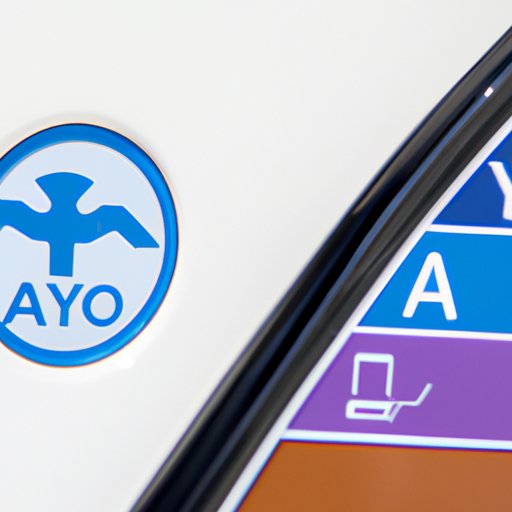Introduction
Toyota has been a leader in the automotive industry for decades, and its commitment to innovation is evident in its wide range of hybrid cars. Hybrids combine gasoline-powered engines with electric motors to deliver improved fuel economy and reduce emissions. In this article, we’ll explore how Toyota hybrids work and examine the benefits and drawbacks of owning one.
Exploring the Mechanics of a Toyota Hybrid: How Does It Work?
The Toyota hybrid system consists of two main components: an internal combustion engine and an electric motor. The engine powers the car when it needs more power, such as when accelerating or climbing hills. The electric motor kicks in when the car is cruising at a steady speed and helps the engine conserve fuel. Both the engine and the electric motor are connected to a single transmission that drives the wheels.
The hybrid system is powered by a battery pack that stores energy from regenerative braking. When the driver applies the brakes, the electric motor acts as a generator, converting the car’s kinetic energy into electrical energy. This energy is then stored in the battery pack and used to power the electric motor when needed.
The hybrid system is controlled by a computer system that monitors the speed, throttle position, and battery charge level. It uses this information to determine when to switch between the engine and the electric motor, and when to charge the battery. This allows the hybrid system to maximize fuel efficiency while providing the power and performance drivers expect.
An In-Depth Look at the Technology Behind Toyota Hybrids
The battery systems in Toyota hybrids are made up of nickel-metal hydride (NiMH) cells that store electrical energy. These cells are lightweight and durable, and they can be recharged hundreds of times without losing capacity. Toyota hybrids also feature advanced battery management systems to ensure optimal performance and longevity.
Electric motors in Toyota hybrids are brushless and permanent magnet motors. These motors are highly efficient and produce high torque at low speeds, making them ideal for hybrid vehicles. They are also designed to run quietly and require minimal maintenance.
Regenerative braking is a key component of hybrid technology. When the driver applies the brakes, the electric motor acts as a generator, converting the car’s kinetic energy into electrical energy. This energy is then stored in the battery pack and used to power the electric motor when needed.
Understanding the Benefits and Drawbacks of a Toyota Hybrid
The primary benefit of a Toyota hybrid is cost savings. Hybrids use less fuel than traditional gasoline-powered cars, which means you’ll spend less money at the pump. According to a study conducted by the U.S. Department of Energy, hybrid owners save an average of $1,400 per year on fuel costs.
Hybrids also have a positive environmental impact. By using less fuel, hybrids emit fewer greenhouse gases, which helps reduce air pollution. Additionally, many hybrids qualify for government incentives, including tax credits, which makes them even more affordable.
The main drawback of a Toyota hybrid is the higher upfront cost. Hybrids tend to be more expensive than comparable gasoline-powered cars, but the long-term cost savings make up for the initial investment.

Examining the Different Types of Toyota Hybrids Available
Toyota offers a wide range of hybrid cars, including the Prius, Camry Hybrid, and Highlander Hybrid. The Prius is Toyota’s flagship hybrid vehicle and offers excellent fuel economy, along with a spacious interior and modern amenities. The Camry Hybrid offers similar fuel economy, along with a comfortable ride and plenty of cargo space. The Highlander Hybrid is a larger SUV that offers impressive fuel economy and off-road capability.

Comparing the Fuel Efficiency of Toyota Hybrids to Other Cars
Toyota hybrids offer excellent fuel efficiency compared to other cars. The Prius, for example, has an EPA-estimated fuel economy rating of 58 mpg city/53 mpg highway, while the Camry Hybrid has a rating of 51 mpg city/53 mpg highway. Similarly, the Highlander Hybrid has a rating of 34 mpg city/30 mpg highway. By comparison, the gasoline-powered versions of these cars have ratings of 28 mpg city/39 mpg highway, 25 mpg city/35 mpg highway, and 19 mpg city/26 mpg highway, respectively.
Several factors can affect the fuel efficiency of a Toyota hybrid. For example, driving conditions, terrain, and vehicle maintenance can all have an impact. However, over time, the cost savings from driving a hybrid will add up, making it an attractive option for budget-conscious drivers.
Conclusion
Toyota hybrids offer a number of benefits, including improved fuel efficiency, reduced emissions, and cost savings. They also come in a variety of models, from compact cars like the Prius to larger SUVs like the Highlander. While they may cost more upfront, the long-term cost savings make them an attractive option for drivers looking to save money at the pump.
Hybrid technology is constantly evolving, and Toyota is at the forefront of this movement. With its commitment to innovation and dedication to delivering quality vehicles, Toyota is sure to remain a leader in the industry for years to come.
Final Thoughts
Toyota hybrids are a great option for drivers who want to save money and help the environment. By combining gasoline-powered engines with electric motors, hybrids offer improved fuel economy and reduced emissions. With their cost savings, environmental benefits, and advanced technology, Toyota hybrids are a smart choice for drivers looking for a reliable, efficient car.
(Note: Is this article not meeting your expectations? Do you have knowledge or insights to share? Unlock new opportunities and expand your reach by joining our authors team. Click Registration to join us and share your expertise with our readers.)
